
 Department of Conservation and Recreation
Department of Conservation and Recreation
Conserve. Protect. Enjoy.
 Department of Conservation and Recreation
Department of Conservation and Recreation
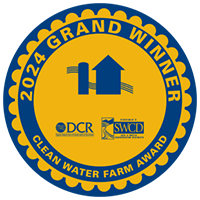
The annual Virginia Clean Water Farm Awards recognize farmers that implement conservation practices and do their part to preserve water quality. The program is sponsored by the Virginia Department of Conservation and Recreation in partnership with Virginia’s 47 Soil and Water Conservation Districts. Grand Basin winners represent the most exceptional of these awardees. One Grand Basin winner is selected from each major river drainage basin that received nominations. The winners’ commitment to conservation and innovative use of best management practices makes them role models for producers throughout the commonwealth.
Many thanks to district staff members who made 2024 another exceptional year for the Clean Water Farm Awards.
See photos of the award ceremony.
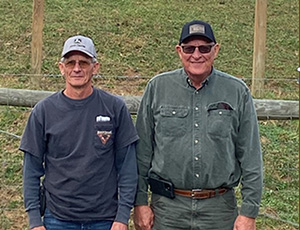
Big Sandy - Tennessee River Basin
David and Jeff Spence, Spence Brothers Farm
Nominated by Evergreen Soil and Water Conservation District
Located in mountainous Southwest Virginia, Spence Brothers Farm, operated by Jeff and David Spence, faced an uphill battle to find a reliable water source for their cattle. Before partnering with their district, their livestock continuously grazed pastures and relied on streams that often ran dry, leading to overgrazing, degraded water quality and loss of livestock. The Spence brothers developed a conservation plan that transformed their farm’s practices, installing over 3.7 miles of interior and exclusion fencing to create eight rotational grazing paddocks across 170 acres. They also strategically placed seven water troughs to eliminate excessive travel and facilitate weight gain, offering an easily accessible way for their 70 cattle to satiate their thirst. To further address water quality concerns, Spence Brothers Farm established riparian buffers to protect adjacent streambank. The exclusion fencing not only contributes to cleaner water but also works in tandem with trees and shrubs planted on steep pastures to support habitat for wildlife including bears, turkeys, rabbits and birds. Spence Brothers Farm’s commitment to conservation has improved productivity, water quality and the health of their herd.
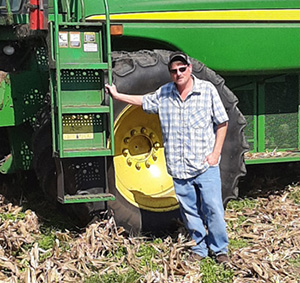
Coastal
Nathan Eulo, Eulo Farms
Nominated by Eastern Shore Soil and Water Conservation District
Nathan Eulo, owner of Eulo Farms, is an environmental steward of the Eastern Shore of Virginia. Eulo Farms spans approximately 1,570 acres of cropland and 20 acres of woodland in Accomac. Mr. Eulo participates in the Whole Farm Approach and has a new nutrient management plan written every year. He historically plants and terminates wheat cover crops in May to optimize soil benefits and uses split applications of nitrogen and phosphorus for corn and soybeans. For years, he has used no-till practices on his cropland and protects adjacent wetlands by adhering to at least 100 feet buffers. By implementing these conservation practices, Mr. Eulo does his part to protect water quality in the Chesapeake Bay. Mr. Eulo’s conservation ethic extends to wildlife by planting clover near grain fields for the dual purpose of sustaining the local deer population while protecting cash crops. Passionate about education, he participates in career days with local schools to teach students where the food they eat comes from. Mr. Eulo’s dedication to sustainable farming and community engagement embodies responsible land stewardship.
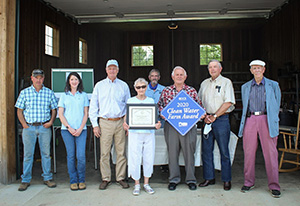
James River
The W. Copley and Margaret K. McLean Family, Swift Run Farm
Nominated by Culpeper Soil and Water Conservation District
Swift Run Farm, a 700-acre all-beef operation in Green County, has been owned by The Copley and McLean families since 1962 and is currently operated by third generation farmer Lee McLean. Swift Run Farm began implementing three livestock stream exclusion projects with their district in 2016, and ultimately installed 68,158 feet, nearly 13 miles, of stream exclusion fencing, protecting all streams on the farm. Mr. McLean also adopted a rotational grazing system consisting of 2.5 miles of rotational fencing and 6 stream crossings and installed an alternative watering system consisting of 4 wells, 26 frost-free troughs and nearly 5 miles of pipeline. Mr. McLean is actively working to improve the pastures on the farm, participating in a Conservation Stewardship Program contract through the Natural Resources Conservation Service to implement prescribed grazing, control weeds, and plant clover to fix nitrogen in the soil. The farm is also converting small sections of lower quality pasture into wildlife game plots and native warm season grasses.
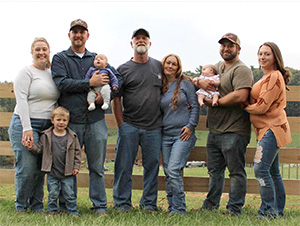
New-Yadkin River
Jennings Family, Jennings Farm
Nominated by New River Soil and Water Conservation District
Jennings Farm is a family-owned cow/calf operation spanning approximately 370 acres in Carroll County owned by lifelong cattle farmer, Dennis Jennings. In 2020, Dennis Jennings began transitioning management to his son, Ethan, who in 2022 spearheaded participation in a USDA program that enhanced water accessibility and quality throughout the farm. The new system has notably reduced cross-contamination risks and improved cattle health. Ethan employs rigorous management practices, including rotational grazing and meticulous record-keeping for herd health. Hybrid vigor is maintained through a mix of Angus, Simmental, Galabieh and Hereford cattle, resulting in productive replacement heifers and long-lived, healthy calves. In the spring of 2023, the Jennings family signed their entire farm up for a NRCS/BMP piggyback, which excluded the livestock from all streams located on the property and implemented a rotational grazing system. The grazing system has been a tremendous asset to the farm. Committed to conservation, Jennings Farm follows a nutrient management plan, employs winter wheat cover cropping, and holds a Beef Quality Assurance certification. The Jennings family also fosters community engagement, hosting teambuilding events for local youth. Future generations will benefit from the Jennings family’s commitment to soil and water conservation.
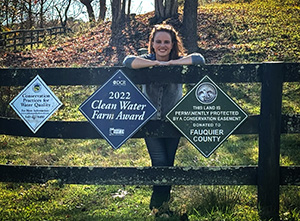
Potomac River
Vanessa Sandin, Pohick Farm
Nominated by John Marshall Soil and Water Conservation District (JMSWCD)
Vanessa Sandin is a role model for new farmers aiming to minimize their impact on the Chesapeake Bay. Through her work at Pohick Farm, a 400-acre operation in Delaplane, Sandin has dedicated herself to understanding how her farm is connected to the Goose Creek-Mitchells Branch Watershed and embraced implementing mitigation practices such as livestock stream exclusion, rotational grazing, and forested riparian buffers. In 2020, Ms. Sandin took action to fence 90-head of stockers out of the streams and installed an alternative water system that consisted of a new well and four troughs, protecting 2.4 miles of streambank and 66 acres of riparian buffer. Ms. Sandin also has active Environmental Quality Incentives Program and Conservation Stewardship Program contracts that include additional best management practices. Ms. Sandin’s contributions to conservation do not end with Pohick Farm, as she is an active participant in community events focused on agricultural best management practices and is vocal in her support of working with soil and water conservationists at the local and federal levels. Ms. Sandin has been an exceptional partner in the district’s efforts to implement conservation practices and is a true steward of the land.
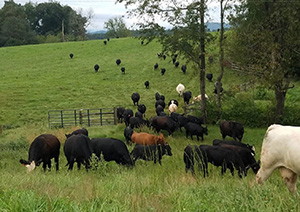
Rappahannock River
O. Bruce Gupton, The Rocklands Foundation
Nominated by Culpeper Soil and Water Conservation District
Soil and water quality are a major part of the day-to-day operation at The Rocklands Foundation, a 2,200-acre historically significant farm operated by the Gupton family in Orange County. The Gupton family began conservation planning efforts with their district in 2020 due to concerns over the lack of reliable water for cattle, and they have since completed extensive work to preserve the natural and historic resources on the farm. The establishment of a rotational grazing system and the installation of a series of water troughs supply the cattle with clean, reliable water, and all streams on the property are protected with 5.5 miles of exclusion fencing supplemented by 33 acres of riparian buffers. In addition to protecting water quality, the cattle have become easier to manage, herd health and safety have improved, and they have added flexibility to better utilize the forage through stockpiling for winter. The Rocklands Foundation is permanently protected through a conservation easement held by the Virginia Outdoors Foundation and is also on the National Register of Historic Places and is a Virginia Historic Landmark.
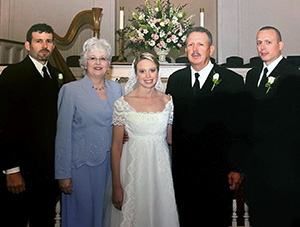
Roanoke River
Lanier Easley, Easley Farm
Nominated by Pittsylvania Soil and Water Conservation District
Lanier Easley implements a wide range of conservation practices on Easley Farm, a 720-acre livestock operation in Pittsylvania County. Mr. Easley has participated in conservation programs with his district for over 30 years and currently maintains a herd of 220 brood cows. To make the best use of grazing land, Mr. Easley utilizes rotational grazing and alternative watering facilities, protecting 5.7 miles of streambank with stream exclusion fencing and 40 acres of riparian buffer. He routinely takes plant and tissue samples to ensure soil health for the best quality forage to feed his cattle. Easley Farm also participates in Natural Resource Conservation Service programs and is enrolled in the Conservation Stewardship Program to help with Herbaceous Weed Control, Overseeding with Grass and Legumes and Grazing Land Management. He strives to implement conservation practices, when possible, to help improve the surrounding water quality and promotes information about conservation programs and practices to other producers throughout the area.
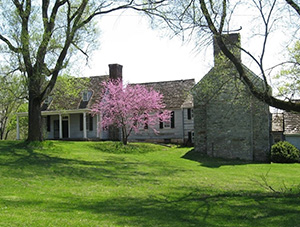
Shenandoah River
The Clermont Foundation, Clermont Farm
Nominated by Lord Fairfax Soil and Water Conservation District
The Clermont Foundation is a pillar of environmental and historical stewardship in their community. The Clermont Foundation manages a 360-acre working farm in Clarke County. First surveyed by 18-year-old George Washington on October 19, 1750, the farm is of clear historic significance to not only the local area, but to the nation. After being donated to the Virginia Department of Historic Resources in 2004, Clermont Farm managers worked with their district to exclude over 9,000 feet of streambank and collaborated with the Department of Forestry to develop a Forest Stewardship Management Plan to bolster native trees and shrubs in the riparian buffer. The farm currently runs 45 cow/calf pairs and 40 sheep on 117 acres of pasture. The conservation and agricultural practices The Clermont Foundation implements are no secret to their neighbors and community members. The Foundation takes joy in providing the farm as an educational venue for the community, including school groups and adult educational workshops, and each facet of the operation is used as an opportunity to teach.
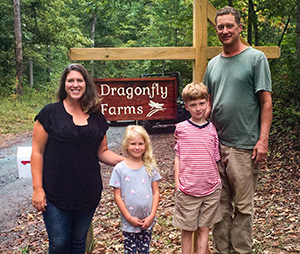
York River
Bruce and Katherine Johnson, Dragonfly Farms
Nominated by Thomas Jefferson Soil and Water Conservation District
When Bruce and Katherine Johnson purchased Dragonfly Farms just west of Louisa in 2017, they confronted severely eroded soils and degraded conditions after years of corn and soybean row-cropping, motivating them to stabilize the soil, create a productive farming system, and transform the property into a model for regenerative practices. Mr. and Ms. Johnson currently graze 100 cows along with 40 ewes to produce 100% grass-fed meat sold throughout the Richmond-area. Year-round healthy sod cover on the land holds soil and nutrients in place while extensive rotational grazing management actively recycles nutrients on the farm. Livestock have been excluded from all streams on the property, protecting over 4 miles of streambank while creating 94 acres of buffer. The Johnson family partnered with NRCS’s “Working Lands for Wildlife” program to further diversify the farm, and plant 20 acres of multispecies annuals every year using no-till and broadcast methods for seasonal grazing. The Johnsons purchased a neighboring farm in 2022, adding another 4 miles of exclusion fencing and 150 acres of buffer to their operation, and intensified grazing management to improve forage quality. Bruce and Katherine Johnson’s commitment to revitalizing soil health and protecting water quality is evident by their prolific adoption of best management practices.
See the 2023 CWFA Grand Basin Award winners.

